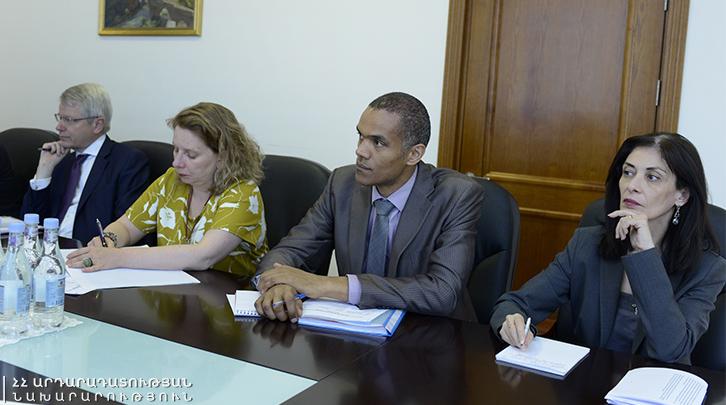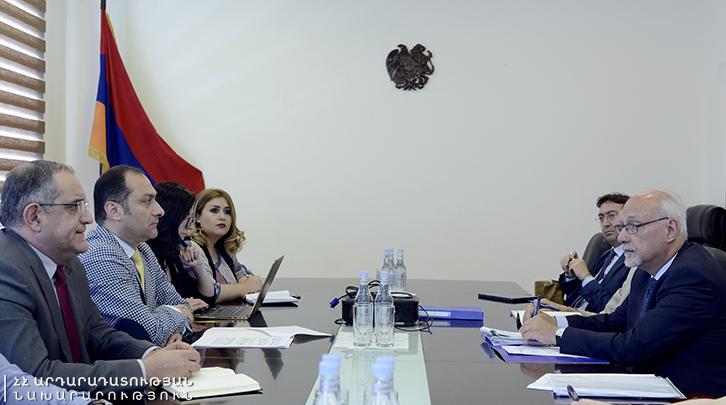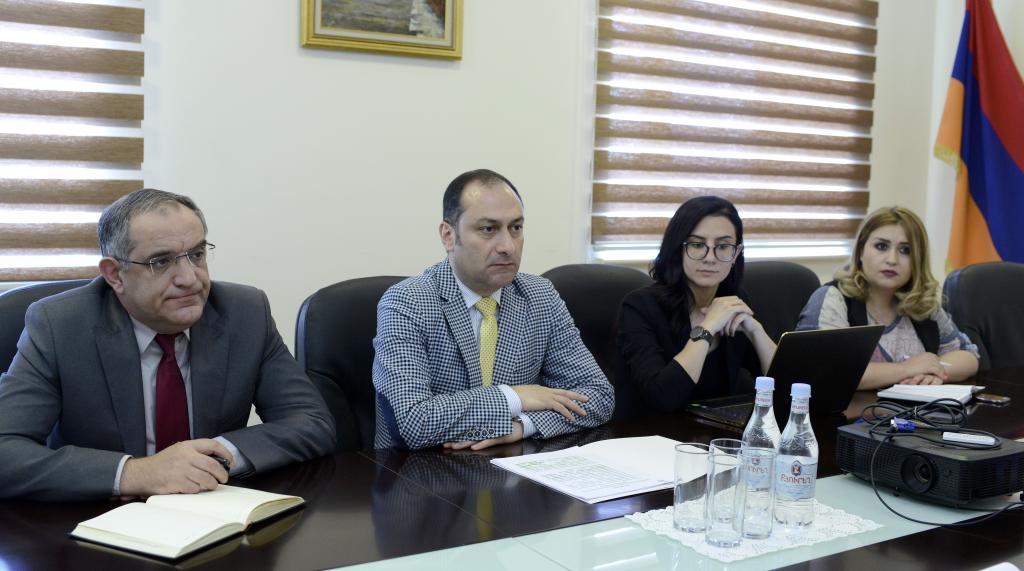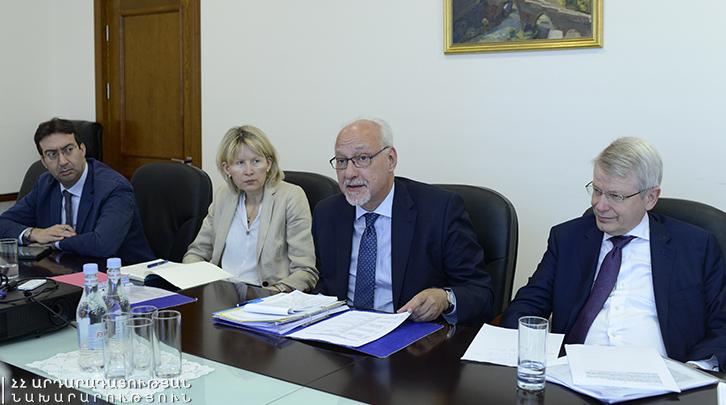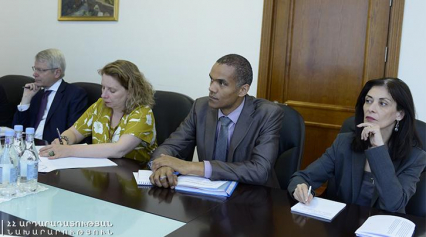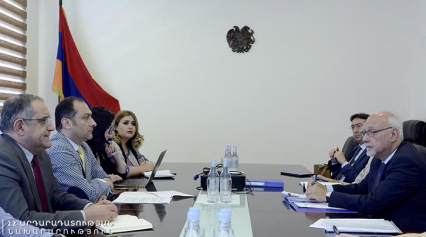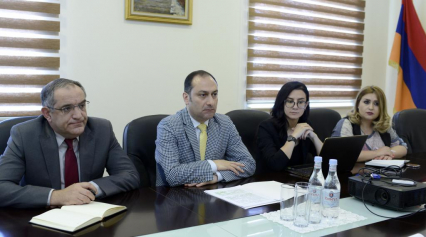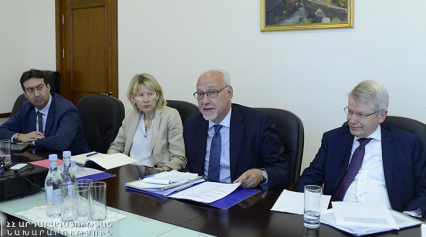CoE supports judiciary reforms in Armenia: Minister of Justice meets with representatives of high-level CoE delegation
30/05/2019
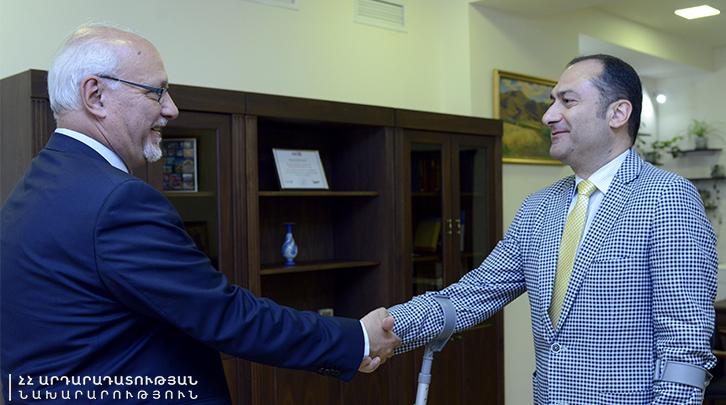
Today, Minister of Justice Artak Zeynalyan received the high-level delegation headed by Director General of Human Rights and Rule of Law of the Council of Europe Christos Giakoumopoulos. The members of the delegation were Secretary of the Venice Commission Thomas Markert, Head of Department of Justice and Legal Co-operation Hanne Juncher, Executive Secretary of the Group of States against Corruption (GRECO) Gianluca Esposito, Head of the Council of Europe Office in Armenia Natalia Vutova and political consultant, representative of the Directorate for Political Affairs Maxim Longang. Deputy Ministers Vigen Kocharyan and Anna Vardapetyan also participated in the meeting.
The Minister of Justice welcomed the visit of the delegation and highly appreciated the current level of Armenia-CoE relations. According to the Minister, in 2018, an unprecedented event took place in Armenia, as a result of which the party that had been forming illegitimately for decades was removed from power through a
non-violent revolution, and after the revolution, people have trusted all the elections that have taken place. "After we came to power, the Prime Minister announced that he refuses all the practices that existed in the past when the executive power would try to impose decisions, or interfere in the activities of the court, for that matter. In the course of the past year, the Prime Minister has declared many times and from many platforms that there is political will to have an independent judiciary in Armenia, and the changes that took place in Armenia were institutionally sufficient to enhance the existence of an independent judiciary. For this, it is necessary to have judges who are ready to act within the scope of legality, justice and law," Artak Zeynalyan said, emphasising that, over the past year, the opportunity given to the judicial power has not been realised, and even though courts are no longer under the influence of the incumbent authorities, they are still under influence due to corruption or former contacts.
The Minister informed that in the beginning of this year, the Ministry of Justice, having assessed the situation that has been created, undertook the development of a strategy on judicial and legal reforms; the strategy is currently being drafted and will be submitted to the Government for consideration in autumn.
Touching upon the use of the transitional justice toolkit, Artak Zeynalyan noted that it is not on the agenda and is aimed at ensuring transition of the society from the democracy crisis to sustainable democracy. According to the Minister, out of the tools of the toolkit, what is being considered is the need for applying vetting as a tool for systemic reform. The government views vetting as an assessment process that will ensure proper balance between the person holding a public position undergoing this process and the society, which has expectations from this process," the Minister of Justice said, emphasising that, in the context of implementation of vetting and systemic reforms, Armenia also expects the assistance of experts from the bodies of the Council of Europe.
Head of the CoE Delegation Christos Giakoumopoulos expressed gratitude for the reception, stated that the process of implementation of radical reforms in the judiciary of Armenia has been launched and expressed the willingness of the Council of Europe to assist in the implementation of this process. According to him, only through a strategy on judicial and legal reforms, strengthening of human rights protection and the fight against corruption in the judiciary will it be possible to build the trust of citizens of Armenia in the judiciary. "We are here to support you. Your success or failure will be shared," Christos Giakoumopoulos emphasised.
Minister Zeynalyan assured that the reforms in the judiciary will be implemented in line with the Constitution of the Republic of Armenia and international commitments and will ensure wide inclusiveness.
At the end of the meeting, the parties reaffirmed the willingness to deepen the
co-operation and reached an agreement on leading the launched process to success.

